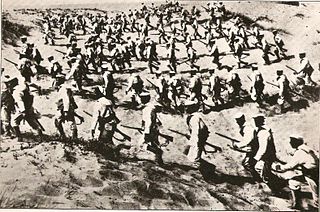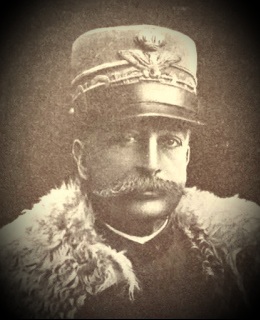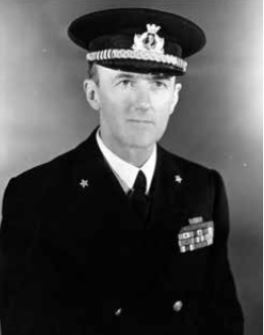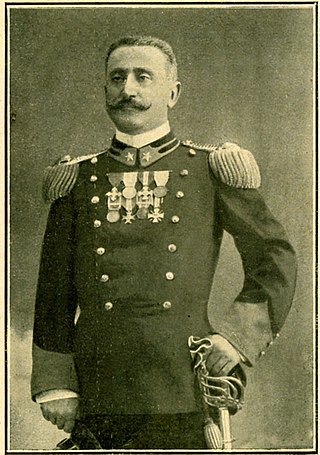
Ugo Cavallero was an Italian military commander before and during World War II. He was dismissed from his command due to his lacklustre performance, and was arrested upon the fall of Benito Mussolini's regime. Cavallero was later freed by the Germans, but refused to collaborate and was found dead the following day.

Ettore Bastico was an Italian field marshal who served as the commander of Axis forces in North Africa from 1941 to 1943 during World War II. In addition to being a general of the Royal Italian Army, he served as the governor of the Italian held Aegean islands and of Libya. After his time in the army, he became a military historian and published several books.

Emilio De Bono was an Italian general, fascist activist, marshal, war criminal, and member of the Fascist Grand Council. De Bono fought in the Italo-Turkish War, the First World War and the Second Italo-Abyssinian War. He was one of the key figures behind Italy's anti-partisan policies in Libya, such as the use of poison gas and concentration camps, which resulted in the deaths of tens of thousands of civilians and have been described as genocidal.

Armando Diaz, 1st Duke della Vittoria, was an Italian general and a Marshal of Italy. He is mostly known for his role as Chief of Staff of the Regio Esercito during World War I from November 1917. He managed to stop the Austro-Hungarian advance along the Piave River in the First Battle of Monte Grappa. In June 1918, he led the Italian forces to a major victory at the Second Battle of the Piave River. A few months later, he achieved a decisive victory in the Battle of Vittorio Veneto, which ended the war on the Italian Front. He is celebrated as one of the greatest generals of the war.
Marshal Guglielmo Pecori Giraldi, OSSA, OSML, OMS, OCI was an Italian noble, general and politician, mostly known for commanding the Italian 1st Army during World War I.

The Battles of Zanzur or Battles of Janzur, were a series of battles that took place in 1911–1912 at Zanzur oasis, near Tripoli during the Italo-Turkish War. During the battles, the Italians unsuccessfully attacked the Turkish-Arab stronghold located approximately twelve miles from the Italian lines at Tripoli until finally achieving a victory on 20 September 1912.

Vincenzo Garioni was an Italian general who saw combat in the Boxer Rebellion, Italo-Turkish War, and World War I. He was the governor of Tripolitania from 1913 to 1914 and later served as the governor of both Tripolitania and Cyrenaica from 1918 to 1919.

Giulio Cesare Tassoni was an Italian general and politician. He was the governor of Tripolitania for a few months in 1915, and was a member of the 30th Senate of the Kingdom of Italy.

The Battle of Ain Zara was fought in December 1911 during the Italo-Turkish War between the Kingdom of Italy and Ottoman Empire forces for the control of the oasis of Ain Zara, near Tripoli in modern Libya, where the Ottomans had established a fortified base.

The Battle of Tripoli was fought in October 1911, during the initial stages of the Italo-Turkish War, and saw the capture of Tripoli, capital city of Tripolitania, by Italian landing forces. It marked the beginning of the land campaign in Libya of the Italo-Turkish War as well as the beginning of the Italian colonization of Libya.

Ain Zara is a town and oasis in western Libya, located in the region of Tripoli.

Asclepia Gandolfo was an Italian military officer, who served as a general in the Royal Italian Army.

Carlo Petitti di Roreto (1862-1933) was an Italian general who was most notable during his service in the Italo-Turkish War and World War I.

Nino Sozzani was an Italian general during World War II.
Ettore Deltetto, also known as Ettore Del Tetto was an Italian general during World War II.

Corso Pecori Giraldi was an Italian admiral. He commanded Italian naval forces in Greece and later the battleship Vittorio Veneto during World War II, and after the war he became Chief of Staff of the Italian Navy from 1955 to 1962.

Remo Gambelli was an Italian general during World War II, Commander-General of the Carabinieri from August 1940 to February 1943.

Benvenuto Gioda was an Italian general during World War II.

Luigi Agliardi was an Italian Major General during the late 19th and early 20th centuries. He was known for his extensive service, participating in the First Italo-Ethiopian War, the Boxer Rebellion and the Italo-Turkish War before his promotion to major general in 1914. He was also known as a figure during the Red Week as he was taken prisoner by the socialists which caused a controversy within his military career.

Osvaldo Paladini was an Italian admiral who served in the Regia Marina from 1882 to 1930. He took part in the Italo-Turkish War, where he was commander of the Red Sea Naval Division, commanding the Piemonte during the Battle of Kunfuda Bay. For this he was awarded the Knight's Cross of the Military Order of Savoy. Promoted to Rear-Admiral during the World War I, he first commanded the Battle Division, and in 1918 the 3rd Naval Squadron. On 2 October 1918, he was awarded the title of Commander of the Military Order of Savoy and the honor of Grand Officer of the Order of the Crown of Italy.


















